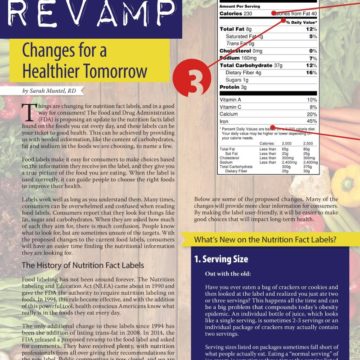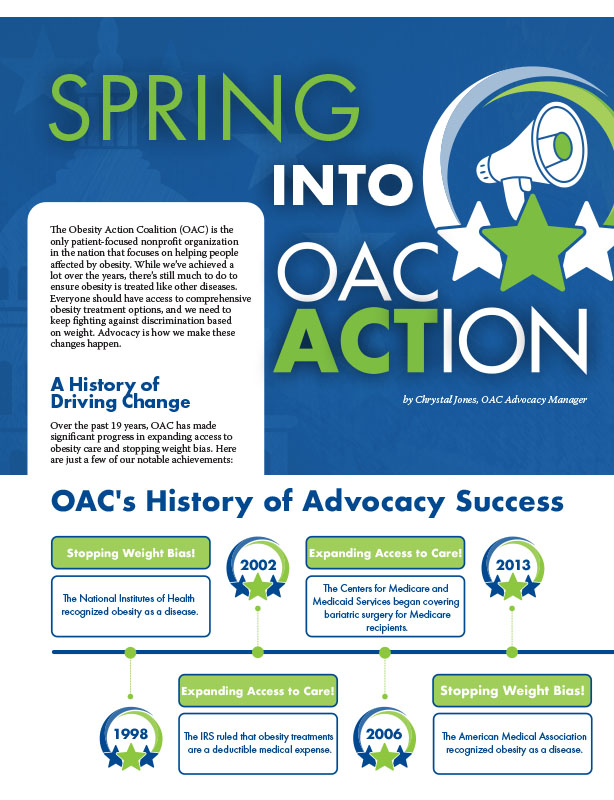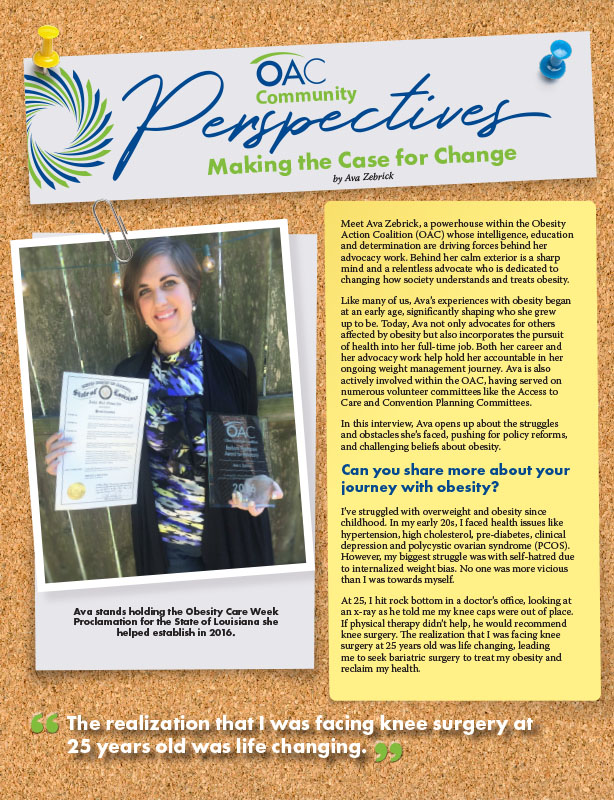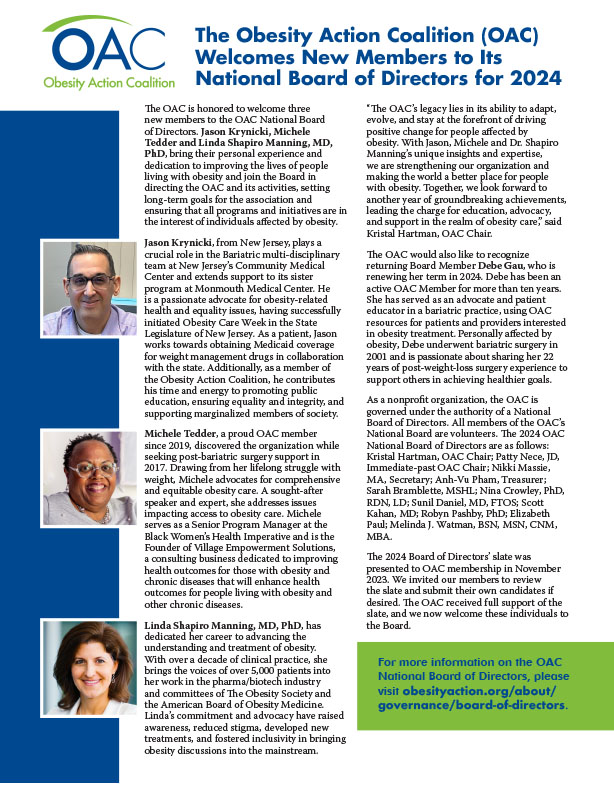Staying Silent about Bariatric Surgery

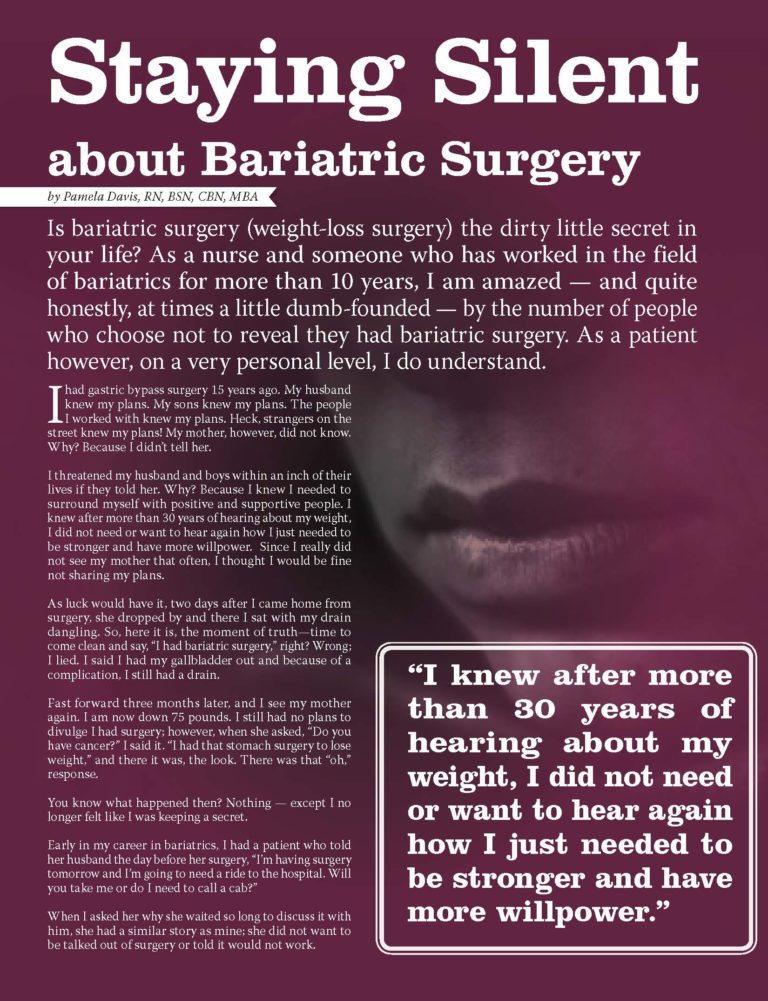
by Pamela Davis, RN, BSN, CBN, MBA
Spring 2016
I had gastric bypass surgery 15 years ago. My husband knew my plans. My sons knew my plans. The people I worked with knew my plans. Heck, strangers on the street knew my plans! My mother, however, did not know. Why? Because I didn’t tell her.
I threatened my husband and boys within an inch of their lives if they told her. Why? Because I knew I needed to surround myself with positive and supportive people. I knew after more than 30 years of hearing about my weight, I did not need or want to hear again how I just needed to be stronger and have more willpower. Since I really did not see my mother that often, I thought I would be fine not sharing my plans.
As luck would have it, two days after I came home from surgery, she dropped by and there I sat with my drain dangling. So, here it is, the moment of truth—time to come clean and say, “I had bariatric surgery,” right? Wrong; I lied. I said I had my gallbladder out and because of a complication, I still had a drain.
Fast forward three months later, and I see my mother again. I am now down 75 pounds. I still had no plans to divulge I had surgery; however, when she asked, “Do you have cancer?” I said it. “I had that stomach surgery to lose weight,” and there it was, the look. There was that “oh,” response.
You know what happened then? Nothing — except I no longer felt like I was keeping a secret.
Early in my career in bariatrics, I had a patient who told her husband the day before her surgery, “I’m having surgery tomorrow and I’m going to need a ride to the hospital. Will you take me or do I need to call a cab?”
When I asked her why she waited so long to discuss it with him, she had a similar story as mine; she did not want to be talked out of surgery or told it would not work. I have worked with people who do not tell their extended family or their friends they have had surgery. When asked how they are losing so much weight, they simply say diet and exercise. While technically you are losing weight through diet and exercise, you are leaving out one major component: “I had bariatric surgery.”
The Importance of Sharing Your Story
Why is it so important for you to share that little tidbit? Unlike someone who has migraines or high blood pressure, we wear the disease of obesity for the world to see. No matter how hard we may try, we can’t hide our weight. This also means we can’t hide our weight-loss. People know when we are losing weight. You can hide your shrinking body in baggy clothes, but you can’t hide your face; and honestly, why would you want to?
So, you have had surgery. You are losing weight. You are feeling good. You, and more specifically your weight-loss, are now topics of conversation. People want to know how you did it. What do you say or not say and why?
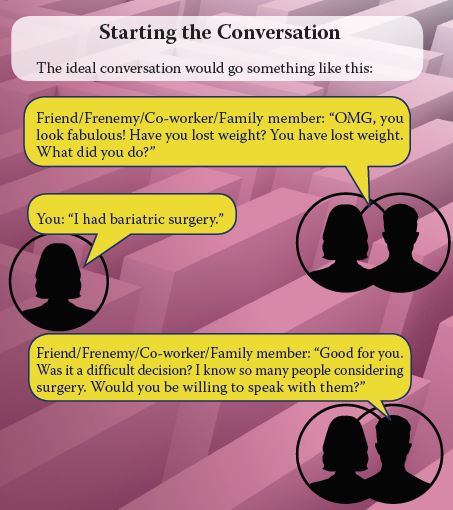
At this point you, my dear friend, would pay it forward by sharing your experience with others who are considering having the surgery. I believe we are often pre-programmed to expect ridicule, doubt and a lack of support when discussing our weight-loss challenges and the idea of bariatric surgery. We are afraid the conversation may go more like this one:
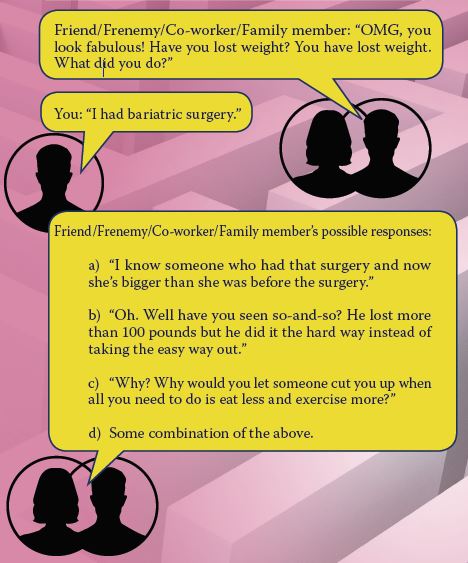
This still does not answer why so many stay silent about their decision to undergo bariatric surgery for the treatment of their obesity. I believe I know the answer – fear. Fear that we will not be supported. Fear that we will be the only person in the world to have bariatric surgery and not lose an ounce. Fear that we will regain the weight. Fear that we will let someone down.
So instead of sharing with the very people who care about us and support us, we keep our treatment a secret. You could definitely argue that it’s nobody’s business if you have surgery. True, it is no one’s business but your own. It is your choice if you undergo any treatment or not and it is your choice if you share your treatment and your journey.
I ask you to think about your journey. Think about all of the factors you considered when choosing surgery. Think about the people who supported you on your journey, if you had supportive people. If you didn’t, think about what it would have meant to you to have someone you could talk to about your excitement and your anxiety.
Own your treatment method. Find your voice. I implore you to pay it forward.
Resources for managing relationships after bariatric surgery:
• Relationships After Weight-Loss Surgery (Obesity Help, 2015)
• Relationship Challenges Before & After Weight-Loss Surgery (OAC; Dr. Medlin)
• Baby Steps – Emotional Adjustment After Weight-Loss Surgery (OAC)
About the Author:
Pamela Davis, RN, BSN, CBN, MBA, is the Bariatric Program Director for Centennial Center for the Treatment of Obesity in Nashville, Tenn. Ms. Davis is a Registered Nurse, Certified Bariatric Nurse and Certified Case Manager. Ms. Davis also serves on the National Board of Directors for the Obesity Action Coalition. In 2001, Ms. Davis had laparoscopic Roux-en-Y gastric bypass surgery at Centennial and has since developed a passion for working with others living with obesity. Ms. Davis will also be speaking at the 5th Annual Your Weight Matters National Convention in the breakout session “Balancing Perspective: A Look at Real Life Post-Bariatric Surgery.”
by Chrystal Jones, OAC Advocacy Manager Spring 2024 The Obesity Action Coalition (OAC) is the only patient-focused…
Read Articleby Ava Zebrick Spring 2024 Meet Ava Zebrick, a powerhouse within the Obesity Action Coalition (OAC) whose…
Read ArticleThe OAC is honored to welcome three new members to the OAC National Board of Directors. Jason Krynicki,…
Read Article




